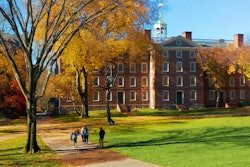Growing up in northern California in the 1930s, Grace Obata Amemiya assumed she would attend the University of California, Berkeley. Two of her older brothers and a sister were Berkeley-educated. Why would she not be?
But Amemiya’s college days were abruptly interrupted in 1942 when the United States herded her and 120,000 other Japanese Americans on the West Coast to inland internment camps amid racist sentiment during World War Two.
Thanks to a gesture by the UC Board of Regents, she is among hundreds of individuals who qualify for a special honorary degree from the same institution that had spurned them during war hysteria. “This is long overdue, but truly awesome,” says Amemiya, an 88-year-old retired nurse now living in Ames, Iowa.
In the wake of Japan’s bombing of Pearl Harbor in December 1941, President Franklin Roosevelt signed an executive order calling for the expulsion of anyone of Japanese descent in “military areas” – which included the state of California. Among those affected were about 700 Japanese Americans enrolled in undergraduate and graduate programs at four UC campuses – Los Angeles, Davis, San Francisco and Berkeley.
Amemiya, for instance, was attending UCSF’s nursing school, as part of her third year of a Berkeley education, when she and her family were given about a week to pack and prepare to leave. The family car, for instance, was sold for a measly $25. She and her family boarded a train – each of them limited to whatever they could squeeze into two suitcases apiece – that took them to a desolate camp along the Gila River in Arizona. Across all internment camps, the terms of confinement varied, but some stretched for as long as four years.
The UC decision marks one of the most recent public acknowledgements of the injustice against Japanese Americans. In the 1980s, Congress determined that the internment was wrong, and President Ronald Reagan signed legislation granting $20,000 in financial reparation to each surviving internee.
UC President Mark Yudof called the regents’ move “one way to apologize” to the displaced students. The diplomas will bear the Latin inscription, “Inter Silvas Academi Restituere Iustitiam,” meaning “to restore justice among the groves of the academy.”
During the war, some UC professors and administrators protested, including college students in Roosevelt’s executive order. Faculty arranged for a few of the interned students to finish their coursework from the camps and graduate from UC anyway. A few others resumed their studies at UC after the war, but the majority did not, officials say. In some cases, the need to earn post-war wages delayed or made impossible the completion of formal education. After all, Japanese American families were forced to give up most of their homes and possessions as part of their expulsion from the West Coast. Whatever they may have left behind was typically stolen or destroyed.
Amemiya never resumed education in California. She went on to enroll and graduate from what was then known as St. Mary’s School of Nursing in Minnesota.
UC officials are soliciting help in identifying students who were unable to graduate because of the internment. They ask former students, relatives and friends to contact them by emailing [email protected] or on weekdays by calling 510-987-0239.
UC spokeswoman Leslie Sepuka says that in the first week after the Board of Regents’ vote in July, officials received 75 responses from former students or those close to them. Officials are cross-referencing old, non-computerized records to confirm the eligibility of individuals who come forward. They are also considering ways to honor the Japanese Americans, such as a commencement ceremoney specifically for them.
“As you can imagine, we’re in full-court press trying to locate former students,” considering the advanced age of the individuals, Sepuka says.
© Copyright 2005 by DiverseEducation.com


















